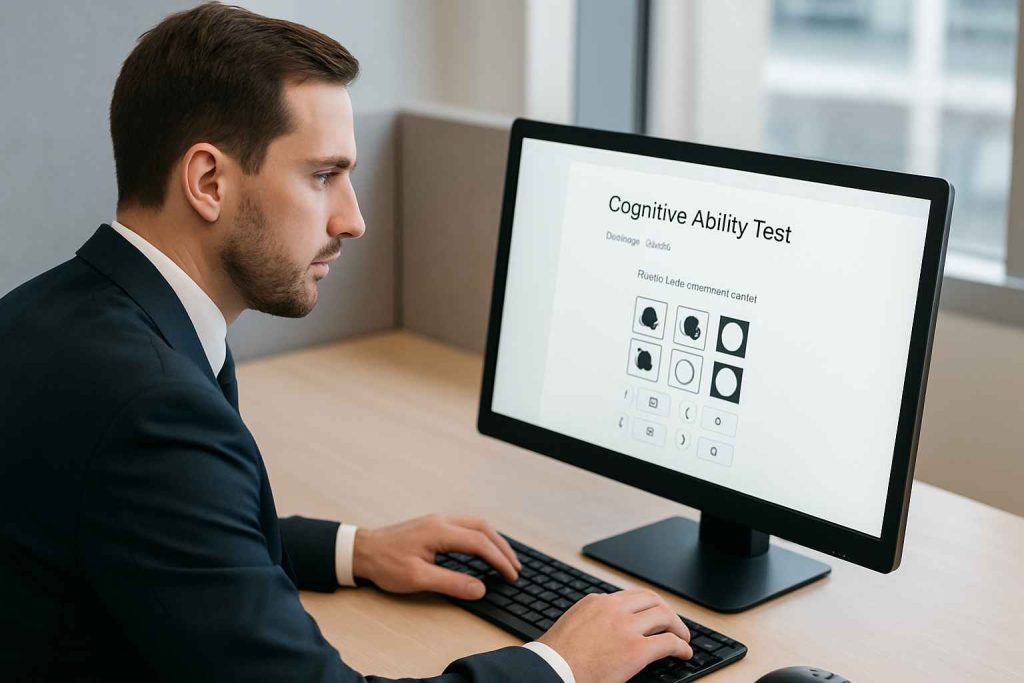When you’re hiring, experience and skills show what a candidate has done—but cognitive assessments reveal what they can do next. Whether it’s problem-solving, adapting quickly, or learning new systems, cognitive ability tests offer recruiters deep insights into a candidate’s mental agility and potential fit.
In this comprehensive guide, we’ll cover:
- What pre-employment cognitive assessments are—and why they matter
- Different types of tests and when to use them
- How to interpret scores & apply results
- Best practices and avoidable pitfalls
- Resources to deepen your understanding
Let’s dive in!
🧠 What Are Pre‑Employment Cognitive Assessments?

Pre-employment cognitive assessments are standardized tests that measure key mental skills essential for job performance. These include:
- Logical reasoning (pattern recognition, sequencing)
- Verbal reasoning (reading comprehension, language logic)
- Numerical reasoning (basic math, data interpretation)
- Attention to detail (detecting errors, sustained focus)
- Learning ability (processing new information quickly)
Empirical research consistently shows cognitive ability is a top predictor of job success—often outperforming credentials or experience in forecasting future performance.
📚 Types of Cognitive Tests
Here’s a quick breakdown:
| Test Type | Measures | Ideal For |
| Logical Reasoning | Pattern, sequence solving | Problem-solving or technical roles |
| Verbal Reasoning | Comprehension, language logic | Communication-heavy and analytical roles |
| Numerical Reasoning | Math fluency, data handling | Finance, analytics, operations |
| Attention to Detail | Spotting inconsistencies or errors | Quality control, data entry, compliance |
| Learning Agility | Speed of grasping new info | Fast-paced, evolving environments |
For more detail on test varieties: Types of Cognitive Tests
🎯 When & Why Recruiters Should Use Cognitive Assessments

These tests fit best in the early candidate evaluation stage, right after resume screening. Why?
- Rapid shortlisting: Easily narrow a large applicant field
- Unbiased screening: Focus on thinking ability, not background
- Talent forecasting: Identify learners ready to grow
- Complement the interview: Adds objective rigor to gut feelings
Keep in mind, they’re not the whole story—pair them with interviews, job samples, or structured behavioral assessments.
📈 Interpreting Scores & Cut-Offs
Most platforms present scores as percentiles or standard scores. Here’s how to use them effectively:
| Score Quartile | Interpretation |
| 80th–100th percentile | Exceptional—standout problem-solver |
| 60th–79th | Strong—likely to perform above average |
| 40th–59th | Solid—sufficient for many mid-level roles |
| Below 40th | Needs more support; may struggle in fast-paced roles |
Use your candidate benchmark (e.g. top performers in this role) to help set passing scores—and regularly review or adjust based on performance data.
Learn more about score interpretation: Understanding Cognitive Assessment Scores
✅ Best Practices for Recruiters

- Validate relevance: Choose tests aligned with key job duties
- Ensure fairness: Use unbiased, scientifically validated tools
- Communicate clearly: Let candidates know what to expect
- Keep privacy top‑of‑mind: Explain data use and retention
- Combine with other assessments: Use a holistic hiring approach
- Review pass thresholds: Regularly check the validity of your cut-offs
- Offer feedback: If possible, share high-level results with candidates—it reflects well on your employer brand
⚠️ Avoidable Missteps
- Over-relying on cognitive tests as the sole selection factor
- Misaligning tests with job requirements—e.g. numerical tests for a creative role
- Setting unrealistic standards—think competence, not perfection
- Neglecting candidate experience—poor communications or confusing instructions decrease engagement
Related Resources
- Cognitive Ability Skills in the Workplace
- How to Test Cognitive Skills for Employment
- Cognitive Assessment Scale
- Cognitive Assessment Examples: Real Questions & Use Cases
- Quick Cognitive Assessments: When & How to Use Them
- Top Cognitive Assessment Tools for Hiring Success
Deep dive intro:
👉 What Is Cognitive Ability? Why It Matters for Employment
🙋 FAQ
Q: Are cognitive assessments legal to use in hiring?
Yes—when they’re job-related, validated, administered fairly, and accompanied by notice. Always consult HR or legal before rollout.
Q: Can I customize cognitive tests?
Some platforms allow custom question selection or job-specific simulations—great for tailored assessment while maintaining standardization.
Q: How long do these assessments usually take?
Most take 10–30 minutes. Balance test length with candidate experience.
Q: Should I use them for senior-level roles?
Yes—but always in combination with behavioral interviews and specialized assessments.
Q: Do remote candidates handle these tests well?
Absolutely. Digital platforms make them easy to take anywhere.
Final Thoughts
Pre‑employment cognitive assessments are a powerful ally—when used thoughtfully. They help recruiters:
- Spot high-potential talent
- Streamline hiring volume with precision
- Boost fairness and objectivity in decision-making
But remember: they’re not the full picture. Combine them with structured interviews, behavioral insights, and job samples to hire thinkers who can do, will grow, and truly fit the role.
At the end of the day, these assessments help you do smart hiring with heart.



Actually no matter if someone doesn’t be aware of then its
up to other people that they will assist, so here it happens.
어제 친구들과 회식 자리로강남가라오케추천다녀왔는데, 분위기도 좋고 시설도 깨끗해서 추천할 만했어요.
요즘 회식 장소 찾는 분들 많던데, 저는 지난주에강남가라오케추천코스로 엘리트 가라오케 다녀와봤습니다.
분위기 있는 술자리 찾을 땐 역시강남하퍼추천확인하고 예약하면 실패가 없더라고요.
회사 동료들이랑강남엘리트가라오케방문했는데, VIP룸 덕분에 프라이빗하게 즐길 수 있었어요.
신논현역 근처에서 찾다가강남룸살롱를 예약했는데, 접근성이 좋아서 만족했습니다.
술자리도 좋지만 요즘은강남셔츠룸가라오케이라고 불릴 만큼 서비스가 좋은 곳이 많더군요.